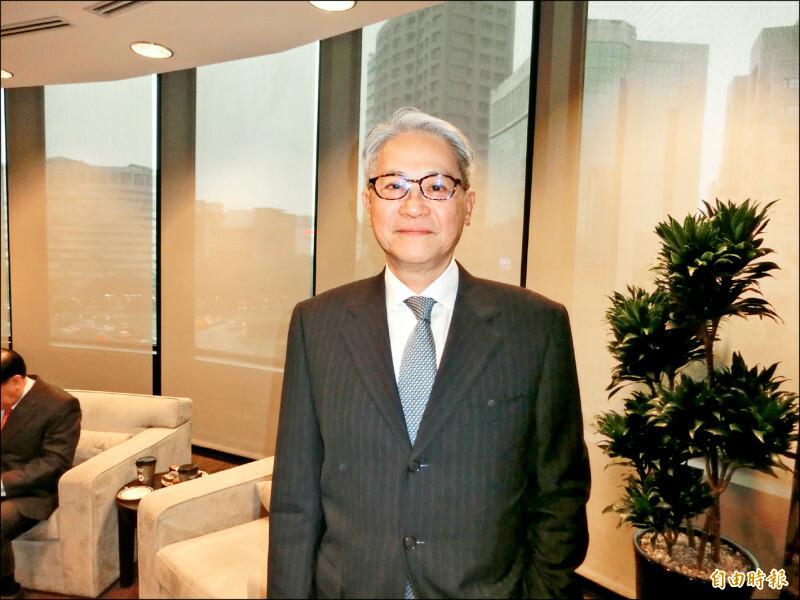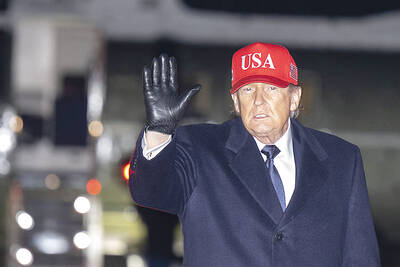The impact of US President Donald Trump’s 32-percent tax on goods from Taiwan, which was announced yesterday and is to be implemented next Wednesday, would “exceed expectations,” the Chinese National Association of Industry and Commerce (CNAIC) said in a statement this morning.
The CNIAC warned that the tariffs would pose significant challenges for Taiwan’s export-driven economy and recommended five immediate countermeasures.
The new tariff policy, announced yesterday, aims to “address the injustices of global trade, reshore manufacturing and drive economic growth for the American people," the White House said.

Photo: Taipei Times
Trump would impose "reciprocal tariffs" on US trading partners, with higher rates for countries with larger trade surpluses, including a tariff of 34 percent imposed on China and a 24-percent tariff for Japan.
The reciprocal tariffs do not include semiconductors, energy, pharmaceuticals and "certain minerals that are not available in the United States," according to a White House fact sheet.
Trump is, however, planning separate tariffs to target semiconductors, a White House official said.
The CNAIC suggested immediately activating crisis response measures, conducting a comprehensive review of the potential impacts and strengthening communication with the US.
It further proposed negotiating to lower the tariffs and providing tax relief and financial assistance to affected industries in Taiwan.
Taiwan was the US’ seventh-largest trading partner last year, according to an Executive Yuan trade report.
Taiwan plays a critical and strategic role in the US economy, producing 90 percent of the world’s advanced semiconductors, the American Chamber of Commerce in Taiwan (AmCham) said in a news release this morning.
US industries rely heavily on Taiwan for high-value, capital-intensive products that cannot be mass-produced elsewhere, such as semiconductors, information and communication technology (ICT) and precision machinery, AmCham said.
Moreover, Taiwan’s microchips significantly impact global supply chains and are essential to US industries from technology to cars; aerospace engineering to national defense, it said.
As both sides of the Pacific are facing an increasingly complex geopolitical landscape, the US and Taiwan should seek to strengthen existing economic and trade relations, it said.
In response to shifting global trends and industries, AmCham called for Washington and Taipei officials to continue to promote exchange and cooperation, to support industrial development, market stability, supply chain security and regional peace.
Furthermore, US exports to Taiwan have almost no domestic competition, with imported goods including agricultural products, aircraft and industrial machinery, AmCham said.
US-Taiwan investments have also been trending upwards, with Taiwan's cumulative direct investment in the US reaching US$17.1 billion in 2022, it added.
In the first 10 months of 2024, investments reached US$14 billion, accounting for 30.8 percent of Taiwan’s total outbound investments, it said.
Taiwan is also a critical source of capital in US financial markets, holding approximately US$256 billion in US Treasury securities as of January last year, ranking among the top ten foreign holders, it added.
Taiwan therefore stabilizes the US financial markets and plays an important role in the flow of US capital, it said.
Through continued investment in the US economy, Taiwanese businesses have contributed significantly to creating local jobs and stabilizing financial markets in the US, while making a significant contribution to supply chain resilience, it said.

Taiwan has received more than US$70 million in royalties as of the end of last year from developing the F-16V jet as countries worldwide purchase or upgrade to this popular model, government and military officials said on Saturday. Taiwan funded the development of the F-16V jet and ended up the sole investor as other countries withdrew from the program. Now the F-16V is increasingly popular and countries must pay Taiwan a percentage in royalties when they purchase new F-16V aircraft or upgrade older F-16 models. The next five years are expected to be the peak for these royalties, with Taiwan potentially earning

STAY IN YOUR LANE: As the US and Israel attack Iran, the ministry has warned China not to overstep by including Taiwanese citizens in its evacuation orders The Ministry of Foreign Affairs (MOFA) yesterday rebuked a statement by China’s embassy in Israel that it would evacuate Taiwanese holders of Chinese travel documents from Israel amid the latter’s escalating conflict with Iran. Tensions have risen across the Middle East in the wake of US and Israeli airstrikes on Iran beginning Saturday. China subsequently issued an evacuation notice for its citizens. In a news release, the Chinese embassy in Israel said holders of “Taiwan compatriot permits (台胞證)” issued to Taiwanese nationals by Chinese authorities for travel to China — could register for evacuation to Egypt. In Taipei, the ministry yesterday said Taiwan

‘LIKE-MINDED PARTNER’: Tako van Popta said it would be inappropriate to delay signing the deal with Taiwan because of China, adding he would promote the issue Canadian senators have stressed Taiwan’s importance for international trade and expressed enthusiasm for ensuring the Taiwan-Canada trade cooperation framework agreement is implemented this year. Representative to Canada Harry Tseng (曾厚仁) in an interview with the Central News Agency (CNA) said he was increasingly uneasy about Ottawa’s delays in signing the agreement, especially as Ottawa has warmed toward Beijing. There are “no negotiations left. Not only [is it] initialed, we have three versions of the text ready: English, French and Mandarin,” Tseng said. “That tells you how close we are to the final signature.” Tseng said that he hoped Canadian Prime Minister Mark Carney

The US’ joint strikes with Israel on Iran dismantled a key pillar of China’s regional strategy, removing an important piece in Beijing’s potential Taiwan Strait scenario, said Zineb Riboua, a senior researcher at the Hudson Institute’s Center for Middle East Peace and Security. In an article titled: “The Iran Question Is All About China,” Riboua said that understanding the Iran issue in the context of China’s “grand strategy” is essential to fully grasp the complexity of the situation. Beijing has spent billions of dollars over the years turning Iran into a “structural strategic asset,” diverting US military resources in the